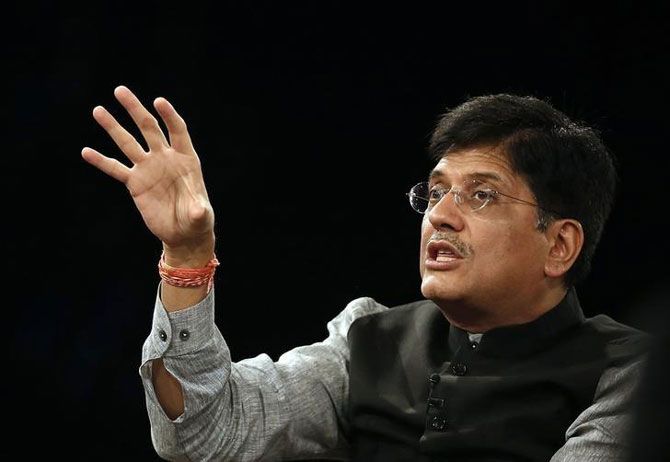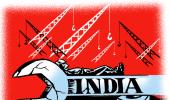‘Challenges will come but we will stay the course. No big step can be taken if one is afraid of criticism. We will not flinch from criticism,’ says Railways Minister Piyush Goyal.

With a select group of journalists, including Business Standard, Railways Minister Piyush Goyal responded to the article written by senior Bharatiya Janata Party leader Yashwant Sinha, and the road ahead for the economy.
Sinha had attacked the handling of the economy, saying 5.7 per cent economic growth in the first quarter of 2017-18 basically meant 3.7 per cent in the older GDP series.
Senior BJP leader Yashwant Sinha has criticised the government’s economic policies.
The whole country and the world have seen that under the decisive leadership of Prime Minister Narendra Modi, India has become the world’s fastest-growing economy for three years in a row.
It is probably the first time in the country’s history that India is driving the world’s growth at the levels that we are today. If you see some of the landmark reforms that this government has brought in, they are unprecedented. Something like the goods and services tax (GST) was never imagined to be possible in a country of the size and scale of India. In fact, we are the largest country in the world to have implemented the GST.
We have brought in structural changes in different aspects of the economy or different aspects of the government’s working. We have broken the silos in different departments and are working as one strong entity for the poorest of the poor. The poorest have been the focus of every action of this government.
We have given this nation one of the cleanest governments ever. We have created an image for India, both in the country and internationally, of a government that can work honestly, and can work for the welfare of the poorest of the poor -- and in many ways, a government that has for the first time attacked black money and corruption at unprecedented levels.
Yashwant Sinha has raised some specific points on the impact of demonetisation and the GST.
It is important to have a long-term vision, and I think there is some misunderstanding (in Sinha’s assessment). Demonetisation and the GST are transformational changes. There is bound to be uncertainty when transformative changes are made. It (economy) may take some time to absorb these changes but this will pass.
Challenges will come but we will stay the course. No big step can be taken if one is afraid of criticism. We will not flinch from criticism.
It would be wrong to say that demonetisation has impacted the economy. If that was true, the data for the quarter subsequent to demonetisation would have reflected that.
Growth in the last quarter has dipped. It is due to several reasons, but the economy will recover. Demonetisation has ticked all the boxes and sent out the message that the government means business when it comes to curbing black money and corruption.
But there are problems with the GST’s implementation.
The GST Council meets on October 6. Some positive announcements, particularly related to exports, could be made. We are trying to educate people on the reform, and are committed to addressing legitimate concerns.
If we have to construct skyscrapers, the foundation has to be strong and for that we have to dig deep, and that may also bring out dirt. That is why we have brought in measures like the benami transactions law and demonetisation. The criticism of the government, particularly on social media, has come from people who have been forced to comply with the rules.
The government is working overtime to provide power by 2018 and toilets by 2022 to all households. Schemes like Ujjwala have improved the lives of the poor, while the Mudra Bank scheme has kindled a spirit of entrepreneurship with loans worth more than Rs 3.5 lakh crore disbursed to over 80 million people.
The nature of jobs in the world is changing. Automation and technology are replacing jobs. It is important to change the mindset towards entrepreneurship. We are moving with the changing times and the aspirations of the people.
Sinha has also raised the issue of the changed methodology to calculate GDP.
The methodology changes every eight-10 years. It is a regular process, and when the methodology changes, the base year to calculate the data also changes.
Several commentators have argued for a fiscal stimulus to arrest the economic slowdown, while there are those who argue against it.
It is too early to get drawn into that debate, or go down the path of discussing fiscal measures and targets.
Our objectives are the following: Ensuring that bottlenecks are cleared and the teething troubles with the GST are removed; continuing our fight against corruption and black money; ensuring each citizen gets a good quality of life; and improving the ‘ease of doing business’.
We have not discussed stimulus (in Cabinet meetings) etc.
We need to focus on strengthening the banks, so that they are able to lend at attractive rates of interest and work with regulators to address issues which we inherited and which had been neglected during the UPA years.
Look at the mistakes the previous government committed from 2008 to 2014, when lending was done indiscriminately. It tried “ever greening” (loans) instead of addressing problems. That achieved nothing. We have spent three years in rectifying the problems.
It also increased the fiscal deficit from 2.9 per cent in 2008 to more than 6 per cent. It took us three years of hard work to put things in order.
But political parties need to respond to the exigencies of elections. Wouldn’t a fiscal stimulus be needed as the Lok Sabha elections draw nearer?
At our national executive in New Delhi (which concluded on Monday), the PM asked us to go beyond elections. The BJP’s target isn’t just winning elections but building a strong foundation for the country to progress.
In our Cabinet meetings, even when the whole Cabinet has argued for some populist measures, the PM has always asked us whether it would be in the national interest.
It isn’t just Sinha. Recently, BJP Rajya Sabha member Subramanian Swamy and S Gurumurthy had also critiqued the government’s economic policies.
That is evidence of the BJP being a democratic party, people are free to voice their views.
Fraternal organisations of the Rashtriya Swayamsevak Sangh, like the Bharatiya Mazdoor Sangh and others, have also flagged their concerns.
They have their concerns and we address those we can. We have a healthy relationship. We agree to disagree.
For example, they are opposed to FDI (foreign direct investment). We disagree with that, but we have taken several labour-friendly steps that they had come to us with.
Image: Railways Minister Piyush Goyal. Photograph: Reuters.












 © 2025
© 2025